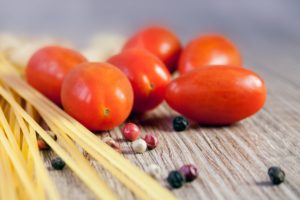Eat Carbs with an Understanding of Their Role in Our Diet
 On Day 3, God created fruits, vegetables, grains, seeds, nuts – all types of foods with carbohydrates. And God saw that his creation was ‘Good.’ On Day 6, He instructed man saying, “I give you every seed-bearing plant on the face of the whole earth and every tree that has fruit with seed in it. They will be yours for food (Gen 1:29 NIV).”
On Day 3, God created fruits, vegetables, grains, seeds, nuts – all types of foods with carbohydrates. And God saw that his creation was ‘Good.’ On Day 6, He instructed man saying, “I give you every seed-bearing plant on the face of the whole earth and every tree that has fruit with seed in it. They will be yours for food (Gen 1:29 NIV).”
Seems pretty clear – yours for food– but now in the 21st century, everybody is wondering, are these foods still the ones we are supposed to be eating? What is best for my body?
It’s okay to wonder. Often this spurs us to dig a little deeper, ask better questions, and grow in recognizing our body intuition.
There is no denying that carbs have inherited a bad reputation in our culture. We hear claims that they cause food or sugar addiction, lead to diabetes and inflammatory diseases, raise our blood sugar and insulin, make us gain weight and body fat, feed cancer cells, make us bloated and the list goes on.
As happens often in nutrition messaging, there is a level of truth in these messages along with erroneous information. Often, sound nutrition advice cannot be packaged up into a sound bite or headline. And to be honest, that is why Registered Dietitian Nutritionists are so vitally important- we help individuals create practical plans based on the science, not soundbites.
But are carbs all good? Do they have an important role in our diet? First, we need to answer the question, what is a carbohydrate?
Carbs 101
Carbohydrate is one of three types of macronutrients (the others are protein and fat). Macronutrients are nutrients that your body needs in large quantities for normal growth and development. Essentially we need them to thrive. They provide our body with energy (aka calories) and maintain all body functions.
Vitamins, minerals, fiber, and antioxidants are considered micronutrients because while these are critically important too, we need them in much smaller quantities.
Carbohydrate is the primary source of fiber in our diet, something that most individuals significantly under-consume. In fact, most people meet only ~50% of the daily recommendations for fiber. The average American consumes 17g fiber per day with recommendations to consume 25-38g for women and men (but people following low carb diets average less than 10g/day).
The Institute of Medicine recommends that 45-65% of your daily calories come from carbohydrates. However, other healthcare providers and institutions may claim otherwise, some recommending even more and others less.
There is a very important point that seems to get lost in the carb discussion: We don’t eat carbs. WE EAT FOOD.
Not All Carbs Are One and The Same
 Carbohydrate is a part of many different types of foods. But most foods have a mix of carbohydrate, protein and fat, in various ratios. God didn’t make carbs. He made food for us to eat and enjoy. He created food to nourish our bodies. In fact, it is pretty clever that within all the diversity of foods, most of them have a combination of macro and micronutrients!
Carbohydrate is a part of many different types of foods. But most foods have a mix of carbohydrate, protein and fat, in various ratios. God didn’t make carbs. He made food for us to eat and enjoy. He created food to nourish our bodies. In fact, it is pretty clever that within all the diversity of foods, most of them have a combination of macro and micronutrients!
Why types of foods have carbohydrates?
- Dairy (milk and yogurt)
- Grains (wheat, barley, rye, oats, etc.)
- Seeds (quinoa, hemp, pumpkin, etc.)
- Vegetables (non-starchy & starchy ones)
- Fruit
- Legumes (all types of beans, lentils & peas)
There are also bits of carbohydrate in some nuts and nut butters as well. Meat, poultry, seafood, eggs, and oils generally have none or only traces of carbs.
But wait, there’s more… carbohydrate is also found in a lot of highly-processed food. And sugar is 100% carbohydrate and has virtually no nutritional value.
When we see ‘influencers’ and news media outlets demonizing carbs, all of those whole, nutrient-dense foods are getting lumped with soda, juice, packaged muffins, fancy coffee drinks, gourmet cupcakes, trail mix & granola, honey & added sugars, refined bread & pasta, and all those crunchy snack foods we grab out of convenience.
Whole foods with carbohydrates and highly-processed foods with carbohydrates are not the same. They have no business being lumped together all under one category: carbohydrate. Yes, they all contain carbohydrates – but no, they are not the same. Period.
Don’t Totally Eliminate Eating Carbs
 Before we decide to eliminate carbohydrate because we think it is adding weight to our hips, instigating chronic inflammation and putting us at greater risk for disease, it would be wise to step back and evaluate what types of carbohydrates are we consuming and how much of them show up in our meals? Here are some questions to ask:
Before we decide to eliminate carbohydrate because we think it is adding weight to our hips, instigating chronic inflammation and putting us at greater risk for disease, it would be wise to step back and evaluate what types of carbohydrates are we consuming and how much of them show up in our meals? Here are some questions to ask:
- How often do fast food, take-out or restaurant menu items supplement our daily meals?
- When am I reaching for a quick packaged snack because I forgot to plan ahead?
- How often am I choosing sugar-sweetened beverages for the energy jolt I need to get through the day?
Does everyone need to eat 45-65% of their calories from carbohydrates? Maybe not. Some individuals have a need for higher carbohydrate due to their activity level. Some people naturally get higher carbohydrate in their day because they choose to eat a plant-based diet. But it’s true, some individuals would benefit from a lower consumption of carbohydrate as a way to manage their health and weight. But does that mean that carbohydrate is the devil? Nope.
Why Should We Eat Carbs?
1. Carbohydrates Feed Gut Bacteria to Maintain a Healthy Gut.
Your gut is the home for trillions of bugs – good bugs that support your immune system to fight off infection, synthesize vitamins for good health, support heart and cardiovascular health, play a role in mood & brain function and more. Some current research suggests that an unhealthy gut environment may possibly be connected to weight gain, insulin resistance, and diabetes. Taking care of our gut is not only an important part of wellness but also disease prevention.
The bacteria that take up residence in your gut need to be nourished too. And they thrive off of plants – all types of plants! Prebiotics are certain types of beneficial fibers found in a wide variety of beans and legumes, starchy and non-starchy vegetables, fruit, seeds, nuts, and yes, even grains. Not only that, but these plants also contain a vast array of other vitamins, minerals, and phytochemicals that help develop a diverse and thriving gut flora.
A few plants that are known for their prebiotic power include asparagus, onions, leeks, garlic, barley, oats, apples, bananas, wheat bran, flaxseeds, cocoa beans (yay for super dark chocolate!!). We also know that the more variety of plant foods you include in your meals, the more diverse your microbiome.
2. Carbohydrates Help Enhance Serotonin, Which Makes You Feel Good.
Serotonin is a neurotransmitter, a chemical messenger, that can help boost mood, promote sleep, manage pain and regulate blood pressure. This feel-good messenger is synthesized from tryptophan, an essential amino acid from protein foods. We know that when our body isn’t getting enough tryptophan to convert into serotonin, it can contribute to depression, anxiety and mood disorders.
Protein-rich foods are the place to find the essential amino acid tryptophan but here is the key to getting a serotonin boost – carbohydrate. That’s right! Carbs signal the release of insulin and cause your cells to usher amino acids into your cells, leaving tryptophan in your blood. This makes it easier to get tryptophan to your brain to convert to serotonin.
While any type of carbohydrate-rich foods can produce this effect, choosing from the wide variety of whole food sources would be smart.
3. Carbohydrates Help Your Body Repair After Exercise.
When it comes to building lean body mass and recovering from workouts, protein is promoted, but carbohydrate is beneficial too and often overlooked. Not only does the inclusion of carbohydrate help you replenish glycogen stores after an intense workout, but it also helps your body to secrete insulin. This hormone tells your cells to take up nutrients like protein when they need it most – after exercise. That is when the repair work begins and you begin getting stronger.
So, what’s the play call?
If you are following a diet plan that says carrots are bad, toss out potatoes forever and cashews are a ‘no-no’ because they are higher in carbs than macadamia nuts, then I urge you to consider whether this diet plan really falls in line with your nutrition and health values.
If you want to reach ketosis, then yes, you need to restrict, but if you want to eat a longevity-promoting healthy diet, then the instruction Adam received in the garden applies to you too.
Here are 4 tips to help you add these foods into your meals intentionally and strategically, even if you are trying to lose weight or build lean body mass:
- Choose whole, unprocessed foods with carbohydrates most often.
- Mindfully serve portions of carbohydrate-rich foods. There are 2 easy ways to do this:
- Fill 25% of a 9-inch plate with carb-rich foods
- Serve a portion similar to what you can fill in your cupped hand
- Don’t restrict. Instead, plan. Rather than saying no to a fun food that doesn’t have a lot of nutrient value, tell yourself you can enjoy it when you occasionally plan it as a part of your balanced meals.
- When cravings for processed foods with carbs feel overwhelming, ask yourself why? What is motivating your desire? Low blood sugar? An emotion? A visual cue?
God’s design for nourishment from the beginning of creation is still relevant for today. And it includes a wide variety of plants, many of which include at least some carbohydrate. There’s purpose in His design. Remember you know the Author of all things good, and when you have questions, you can ask Him.
Your word is a lamp to my feet and a light to my path.
(Psalms 119:105 NKJV)




